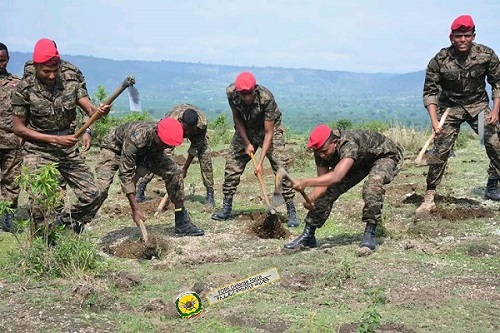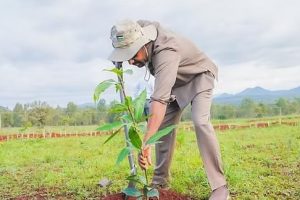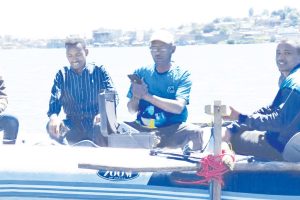
BY EPHREM ANDARGACHEW
Mitigating climate change can play a pivotal role in the success of military operations on the war front. Effective climate change management helps the deployment of army units whenever manmade or natural problems break out. Because climate change problems pose risks to the health, safety, and security of both civilians and soldiers. They can also influence combat operations.
Besides, climate change issues become even more important during protracted engagements, not only because of the effect they have on day-to-day operations at base camps but also because of the significant role they can play in achieving the state’s national objectives. So, the negative effect of climate change goes beyond military operations and getting deeply involved in such non-combat activities as stabilization, reconstruction, and nation-building.
The article that was written by David E. Mosher, Beth Lachman, et al. entitled “The Army’s Green Warriors: Environmental Considerations in Contingency Operations from Planning Through Post-Conflict” stated that the relationship between the soldiers and the environment is a two-way street. On the one hand, soldiers and operations affect the environment; on the other, the environment affects soldiers and operations.
So, if the environment is not planned for and managed well, the presence of soldiers in a base camp can degrade the environment. But environmental degradation can also adversely affect the health and safety of soldiers. Hence, it is imperative to have a climate strategy to address the changing climate and the threats that are coming from climate change.
Indeed, to combine climate change effects, soldiers have devised various mechanisms. Developed countries, including the US, have prepared outlines for how soldiers combat climate change: integrating climate-informed decision-making into all processes; training and equipping a climate-ready force; ensuring infrastructure contributes to successful readiness in changing conditions, and considering climate change as part of supply chain management. They are also upgrading and replacing combat vehicles and using alternative power technology to fossil fuels.
Unlike developed countries, Ethiopia has lower carbon emissions, but the country has prepared green legacy initiatives programs to fight the negative effect of climate change. Accordingly, not only civilians but also soldiers have been contributing to the peace, security, and stability of the country while they are also making various efforts for the development of the nation. They are not only safeguarding mega projects from anti-peace forces but also participating in constructing hydroelectric dams, roads, bridges, and so on for the communities. Hence, they are discharging their social responsibility.
Along with their day-to-day duty, every year soldiers plant tree seedlings to protect the environment which benefits not only the current generation but also the coming generation. When the forces have been marching across the nation to ensure the peace and stability of the people, they, along with their movement, have been discharging their social responsibility. Accordingly, this year the Ethiopian Defense forces are also participating in the green legacy activity of the country as one part of fulfilling their duty.
Ethiopian Federal Defense Engineering Industries Corporation Gafat Armament Industry Director General Getachew Hailemariam said that fighting climate change through green legacies initiatives is imperative to leave a legacy for future generations. It will also enable the country to carry out sustainable development agendas.
The military unit deployed in North Wolo planted a tree seedling together with the residents. Raya Kobo District Agriculture Office Head Mr. Dagne Desale said that the Army has been participating in development activities in the past and has been doing a lot of work. Cognizant of the importance of planting tree seedlings, the army has been active in participating in development issues.
Major Tesfaye Endris, one of the coordinators of the Green Legacy Initiative Program in the army, said that the army has been diligently carrying out the activities of planting and caring for saplings on a regular basis. In addition to carrying out the preparation work that will enable them to achieve their national mission with better results, the army members also took care of the saplings planted in this year’s green legacy initiative program.
In relation to leaving a green legacy, Army member Ayalew Asefa said that by planting and caring for seedlings the army carried out their part to hand over a forested and developed country to the next generation.
The members of the army who leave their green legacy in the planting of tree seedlings said that it is the responsibility of all of the army not only to plant tree seedlings but also to take care of them while carrying out our national mission safely.
Among the residents who participated in the green legacy initiative, Mr. Addsu Welde and Mrs. Genet Tegenge remembered that the army is maintaining our peace and security while participating in development activities such as planting saplings, and cleaning the villages, yard work, and various charity activities.
The army has indeed dual responsibility in discharging its duties. On the one hand, safeguarding the unity and territorial integrity of the country via having military readiness, carrying out duty effectively, being equipped with modern technologies, and leading and managing operations, on the other planting tree seedlings for the coming generation. Because Ethiopia should be, for the coming generation, peaceful, developed, environmentally comfortable, and suitable for living.
The Ethiopian Herald July 31/2022





